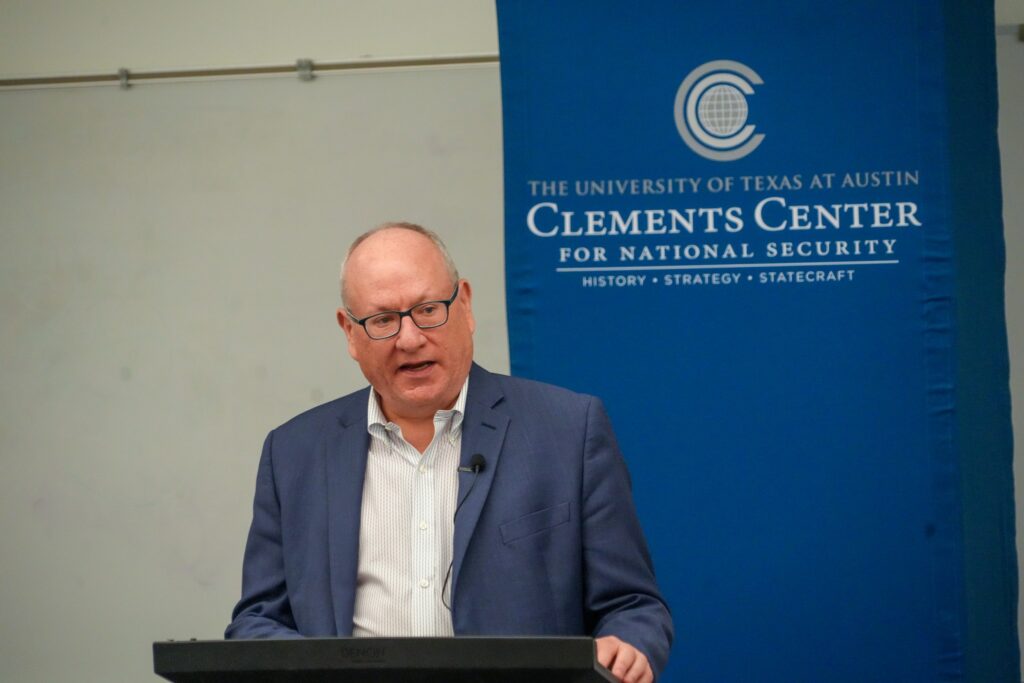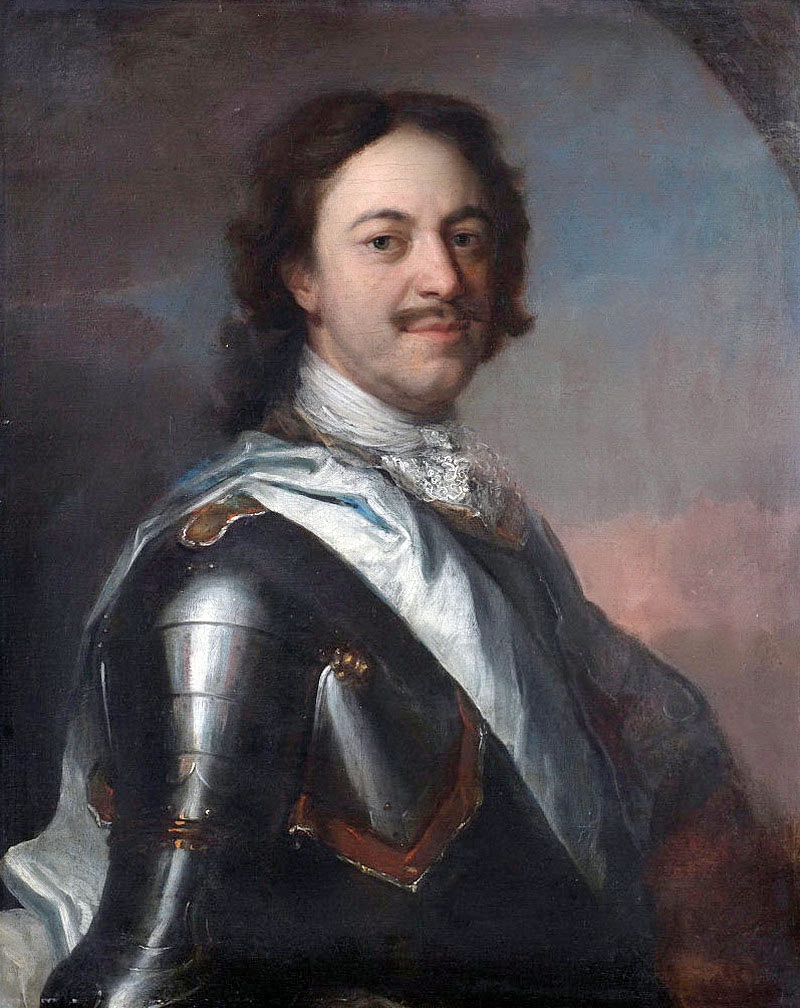Image: Peter the Great
As Ukraine is in the process this week of launching a full-scale ground attack 300km into Russian territory, it is clear this is going to be a long war, and one that may escalate further. This is the first time since World War II that Russia has been invaded! Earlier this year a Ukraine expert gave a talk here in Austin, hosted by the Clements Center for National Security, that puts the war in context.
Michael Kimmage is Professor of History at the Catholic University of America in Wash DC. From 2014 to 2016 he served on the Secretary’s Policy Planning Staff at the U.S. Dept. of State.
“The title Collisions emerged to me as an author only in the process of writing it,” said Kimmage in his talk on the UT campus. “This is that the war in Ukraine in not one war: it is, in fact, multiple wars. To understand its dynamic, it is important to disentangle three separate wars. The first is the war between Russi and Ukraine, which has been a serial set of invasions since 2014. But not less important is the war going on between Russia and Europe; it is not a war of open battles, but nevertheless integral as to what is happening on the battle fields of Ukraine. Thirdly, to bring it home as it were, there is an ongoing war between Russia and the United States.”
Since the first of these is well known from daily reporting, Kimmage concentrated his discussion on the other two. “The drama of the war begins in 2009, deriving from the 2008 NATO summit where membership was promised to Ukraine” with no plan to achieve it. “As compensation, the European Union promised the Eastern Partnership Program. The idea was relatively modest: to provide a legal democratic path not for EU membership for Ukraine but for greater degrees of commercial, legal and human-to-human involvement.” The decision of the President of the Ukraine not to sign sparked a revolution in late 2013 that successfully toppled the president, who fled to Russia in Feb. 2014. “Within days Russia sets in motion the annexation of Crimea,” which was sovereign Ukrainian territory.
For the past two years “Europe has been a key participant in the war and for Pres. Zelensky and the vast majority in Ukraine the European path for the country remains exceptionally important. A Ukraine that is not in Europe is one of Russia’s war objectives.”
In his talk in Austin, Kimmage then turned to U.S. involvement. “When Ukraine finished with its revolution, a quite important relationship develops between Ukraine and the United States.” One element of this is the sanctioning of Russia triggered by their incursion into Crimea. “The U.S. drives the sanctions, and rhetoric from the Kremlin puts the U.S. absolutely at the centre of the story.” According to its view, “Europe is a set of puppet regimes that does the bidding of Washington: the adversary Russia is fighting is not really Ukraine or Europe, it’s the United States.”
Kimmage presents four conclusions in his book, written a year ago, and he says three of these are still entirely valid. “Putin is doing what no Russian leader since Peter the Great has wished to do: break Russia off from Europe. I think the break with the West is the point of the war: it’s going to create a different Russia, and justify the autocratic rule that Putin has established the last 24 years.”

Second, Kimmage believes Ukraine will join the West. “What’s very striking about the war is how committed Europe has become to Ukraine.” He emphasized that soft power (culture and sentiment) is extremely powerful in politics and will help integrate the Ukraine into Europe.
Kimmage said he has trouble with the third conclusion given in the book, namely that the United States will remain deeply committed to Europe. “I think Woodrow Wilson would have understood this war quite well; it fits into the Wilsonian vision of self-determination and make Europe safe for democracy.” He cites the derailment of Ukraine funding in the House of Representatives (which has since been put back on track) as something he could not have predicted or even imagined. “I need to think harder about what it is that will allow or not allow” further US Congressional support.
His fourth conclusion is the most sobering: that the Europe of the 1990s was certainly a cognate for peace, but the Europe of the 2020s is a cognate for war. “This war is enormous, and it’s permeating the meaning of what Europe is.”
It is a war that Putin is not willing to call a war. When he launched on Feb. 24, 2022, it was in his words a “special military operation.” In the book, Kimmage writes “A knock-out blow to Kyiv might have given Putin what he wanted-an easy, quick, not very bloody victory and a country transformed overnight-but that was not at all what Putin got.” The quagmire this horrific denizen from Hades created in 2022 is just as much a quagmire now.
The day before the war, “It was the most powerful Putin had ever been as Russia’s president,” Kimmage writes. “This power slipped through his fingers in the first few days of the war…on the biggest decision of his life he had miscalculated.” Much like Hitler the day before he invaded Russia, or Napoleon the day before he invaded Russia, the military miscalculation of one man has condemned millions to death and misery.
The miscalculation was not just military, but political. “Russia’s brutality and uncounted war crimes was like “turning back the clock of civilization to the darkest days of World War II. The Russian invasion hit the central nerve of American foreign policy. Joe Biden’s visceral response to Putin’s war, and his explanation of it as a war for democracy, would have been easily comprehended by Woodrow Wilson, Franklin Roosevelt, Harry Truman, John F. Kennedy, and Ronald Reagan.”
As a student of history, Kimmage puts it all in perspective at the very beginning of this insightful and well-written book, where he quotes from Thucydides to the effect that similar patterns will repeat throughout history. “Such is the human condition,” he wrote some 2,500 years ago.
The whole thing could be staged as a puppet play. Putin thinks the countries of Europe are puppets, but he has become the puppet of China due to the Ukraine War. Dress the puppets in the garb of 2024, or 500 BCE, and they will dance the same dance. Like a Punch and Judy show, there will be violence, blood and death. The Fates still pull the strings.
COLLISIONS: The Origins of the War in Ukraine and the New Global Instability is by Oxford University Press.
Image: a 1717 portrait of Russia’s Czar Peter the Great
